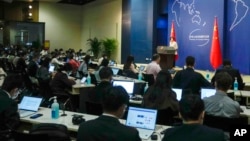Reporting conditions in China have improved since the global pandemic but foreign journalists still face obstacles including visa problems, surveillance and harassment, according to a new survey.
The annual survey by the Foreign Correspondents’ Club of China, or FCCC, found that 81% of respondents said reporting conditions have “somewhat” improved, but nearly all the journalists said the reporting environment does not meet international standards.
Key issues remain, including difficulty in obtaining long-term visas, which leaves foreign news bureaus understaffed; reporters being obstructed by police or other officials while on assignment, and harassment when reporting in Xinjiang and border regions.
The FCCC each year surveys more than 155 correspondents from Asia, Europe, Latin America and North America. Its latest report is based on 101 responses to that survey which looks at working conditions for foreign media.
A spokesperson for China’s embassy told VOA via email that the FCCC members “account for less than half of the foreign journalists in China, which means it cannot represent all of them,” and that China has made efforts to support foreign media.
Referring to the FCCC as an “illegal organization, never recognized by China,” the email added that Beijing is “against using the freedom of the press as an excuse to smear China with false information.”
In response to concerns over visas, the spokesperson said, “In 2021, China and the US reached some common grounds. China has implemented what's been agreed, while the US has not fully delivered.”
Accessing visas is one of the main difficulties cited in the survey. About one-third of respondents said their bureaus remain understaffed because of difficulty in extending or successfully applying for new visas.
Chinese authorities have mostly issued short-term visas. In 2023, only one U.S. outlet was able to get accreditation, the FCCC found. And Canadian media have had no resident reporter in China for four years.
Respondents said that as pandemic restrictions eased, they have returned to an uncertainty over what stories will result in surveillance or trips being cut short.
Four out of five of those surveyed said they experienced interference and harassment, and more than half reported being blocked from reporting or filming by police or other officials.
Nearly all those who reported from Xinjiang or Tibet said they experienced increased harassment. But journalists who reported or tried to travel to other border regions in the country also reported harassment.
After Xinjiang, the area with the most reported obstacles was the border with Russia, with 79% of journalists trying to report from there experiencing difficulties.
One journalist at a European outlet, whom the FCCC does not name, described being followed by several vehicles during a reporting trip to a town along the Russian border.
“They did not interfere during any of our interviews, although they did reach out to at
least one interviewee afterwards. When we checked into our hotel, the hotel staff
referred to us as ‘the journalists state security had warned them about’ earlier,” the reporter said.
Similar experiences were reported by journalists who traveled to Inner Mongolia. The FCCC detailed three cases of plainclothes individuals warning people to not speak with journalists or of following news crews.
The FCCC in its report notes, “Foreign journalists are, according to China’s own regulations, free to report on a wide range of topics and speak to whomever they want.”
The survey showed an increase in journalists being “invited for tea” – a tactic where Chinese officials invite foreign media to an informal meeting. During the meetings, journalists are asked about their coverage and while the FCCC says the exchanges are usually “cordial,” it notes they can be used as a form of intimidation.
Surveillance is another concern, with respondents seeing more sources declining interviews or requesting anonymity.
Nearly all those surveyed said they believe they are targeted with digital surveillance through communication apps or that their homes or offices are bugged. Four of those surveyed said that officials referenced information that could have been known only if the authorities had access to private accounts or devices.
The FCCC says the restrictions and harassment prevents media from reporting a more balanced and nuanced picture of life in China.
“The result is coverage of China that cannot fully capture its massively complex dynamics,” the FCCC said in its report. “Correspondents, restricted in where they can travel and with whom they can speak, no longer have the luxury of delving deeply into topics and painting a nuanced picture of the country. The result is coverage of China that is narrower in scope and less representative.”
China has a poor press freedom record, ranking 179 out of 180 countries, where 1 shows the best environment, on the Press Freedom Index.
Media watchdog Reporters Without Borders, which compiles the index, said China is conducting a “campaign of repression against journalism and the right to information worldwide.”
Editor's note: This article has been updated to include a response from China's embassy in Washington, which came after publication.






